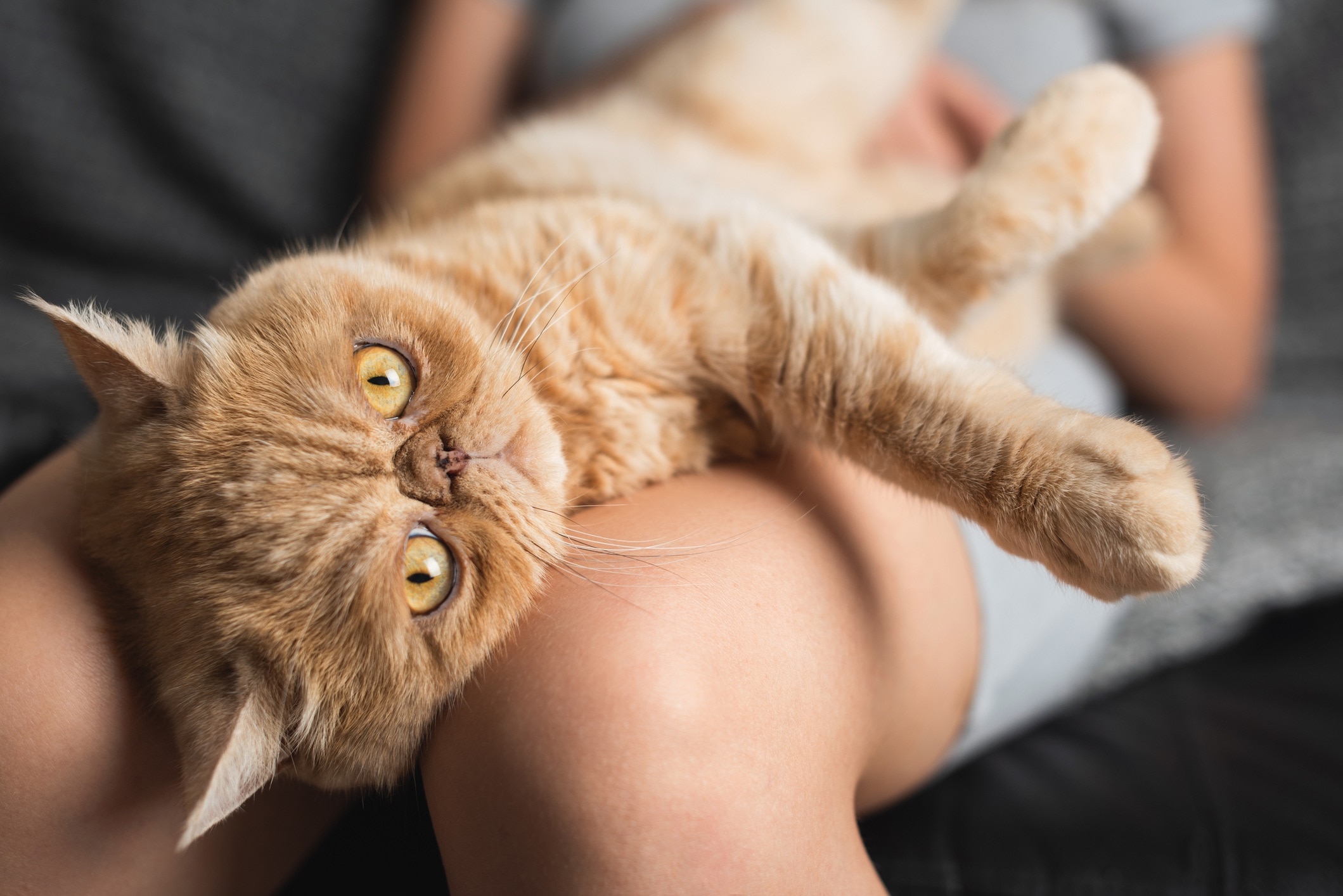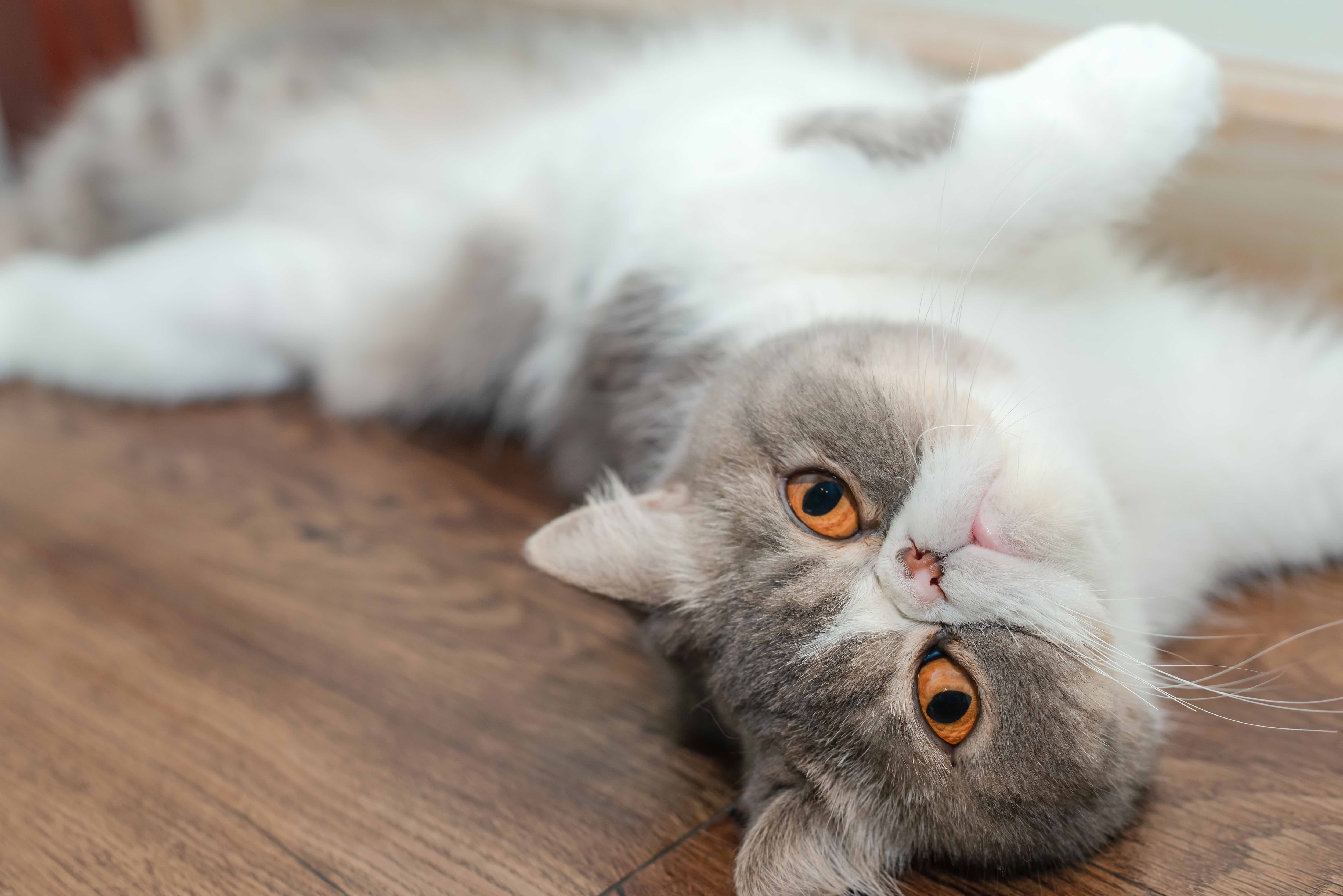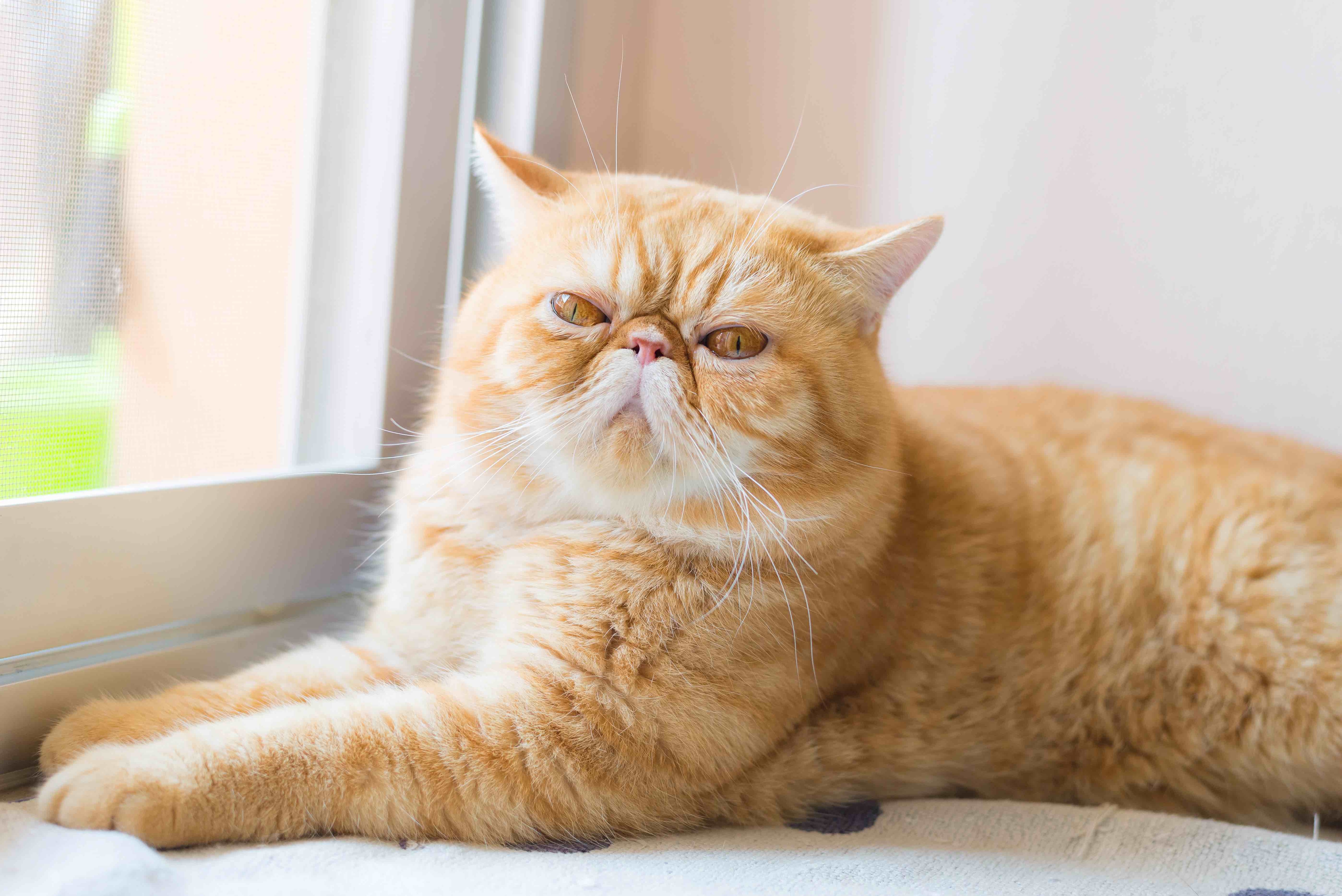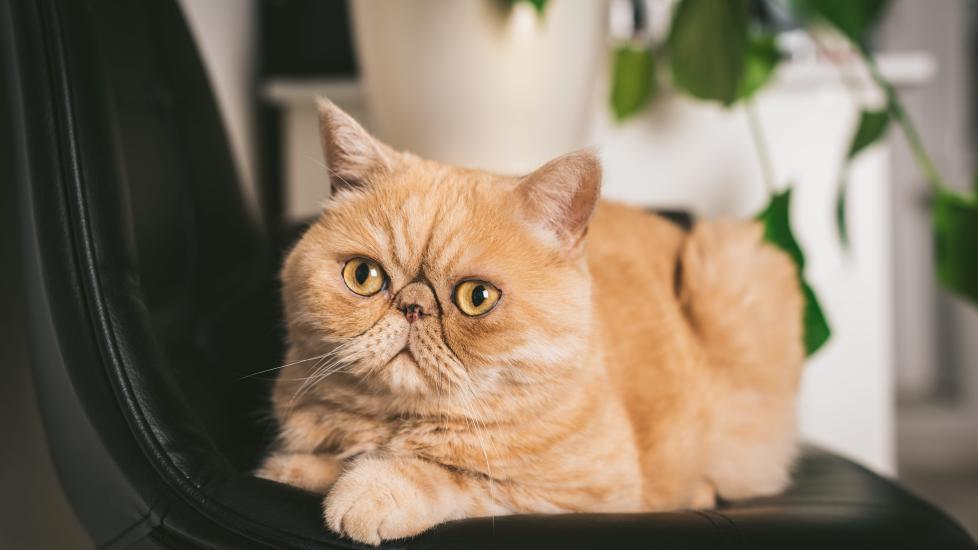Exotic Shorthair
Exotic Shorthair are nearly a mirror image of their sister breed, the Persian cat. The only exception: Their short coat requires less maintenance from their caretaker—hence the breed’s nickname, “the lazy man’s Persian.”
Exotic Shorthairs stand 10–12 inches at the shoulder and weigh 10–12 pounds. Their smooshy, round faces and laid-back nature make them quite charming, and they’re famously depicted by their on-screen caricature, the lasagna-loving Garfield.
Caring for an Exotic Shorthair

Unlike the stereotype suggested by Garfield, Exotic Shorthair cats are not known for laziness. While they enjoy nothing more than a day spent with their human companions, they’re also curious and playful. Exotic Shorthairs prefer not to be left alone and generally get along well with other pets.
Despite having a short but plush coat that’s less prone to matting than their Persian counterparts, Exotic Shorthairs still benefit from (and enjoy!) weekly brushing. They may need to be brushed more frequently in the spring when shedding tends to increase.
Exotic Shorthair Cat Health Issues
Exotic Shorthairs were developed in the 1950s by crossing American Shorthairs or Burmese cats with Persian cats. The Exotic Shorthair lifespan is typically 8–15 years, and they can be prone to conditions common in cats and brachycephalic breeds.
Fortunately, some common conditions inherited from their Persian parent can be avoided, says Stephen Quandt, a feline training and behavior specialist. “Reputable breeders will test for most of these inheritable disorders,” he says. To ensure the health of their kittens, cats that are carriers won’t be bred.
For accidents and illnesses that can't be prevented, pet insurance may be a good investment for Exotic Shorthair kittens.
Hydrocephalus
Exotic Shorthair kittens with extreme brachycephaly, characterized by a very short, flat face, are susceptible to congenital hydrocephalus. Cats with this condition experience abnormal expansion and accumulation of cerebrospinal fluid (CSF) in the brain cavities. Congenital (present at birth) hydrocephalus is rare, but it’s most common in Siamese, Persian, and Manx cats, which puts Exotic Shorthairs at risk, too.
Kittens with congenital hydrocephalus typically exhibit signs early in life, often within the first few weeks to a year after birth. The signs include:
-
A dome-shaped head
-
Small stature
-
Walking in circles
-
Abnormal breathing
-
Failure to thrive
Medical management can offer temporary relief, but many cats require lifelong therapy. Surgical treatment may be an option in some cases.
Brachycephalic Airway Syndrome
Brachycephaly, translating to "short head," contributes to the adorable, smooshed face and flat nose of Exotic Shorthairs. However, their short-faced features can lead to serious breathing problems.
Conditions such as narrowed nostrils, an elongated soft palate, or an abnormally small trachea can restrict an Exotic Shorthair's ability to exercise and withstand heat. This is especially true for overweight cats, senior cats, or cats with allergies.
If you ever see your cat breathing with an open mouth, it’s a medical emergency and they should see their vet right away.
Polycystic Kidney Disease
Polycystic kidney disease (PKD) is a type of kidney disease that cats are born with. It causes cysts to form in the kidneys, which permanently damage the organs and impair waste filtration, fluid balance, and hormone production.
Symptoms of PKD include:
While signs may appear in Exotic Shorthair kittens as young as 6 months old, they are more commonly seen in cats around 7 years old. If you notice any of these changes in your cat, schedule a veterinary exam as soon as possible.
Fortunately, genetic testing can identify carriers of the disease. Cats carrying the PKD gene shouldn't be bred. Ensure you're purchasing a healthy kitten from a reputable breeder by asking for the DNA test results of the breeding parents. If you've adopted your Exotic Shorthair, at-home DNA kits can also detect PKD before symptoms appear.
Obesity
While all cats are susceptible to weight gain, flat-faced breeds like the Exotic Shorthair face an increased risk of breathing issues just by gaining a few extra pounds. To maintain your cat's ideal weight, talk to your vet to determine a recommended daily calorie intake, considering factors such as age, health, and activity level.
What To Feed an Exotic Shorthair
Cats are obligate carnivores, which means they require a diet rich in animal proteins. To maintain a well-balanced diet, opt for commercial cat foods meeting the nutritional standards set by the Association of American Feed Control Officials (AAFCO) for your cat's life stage. Work with your vet to choose the best cat food for your cat.
How To Feed an Exotic Shorthair
Your Exotic Shorthair kitten will grow rapidly and should be fed three to four meals a day. Alternatively, you can opt for free-feeding, leaving food out for them to eat throughout the day.
However, as they grow into adulthood, free-feeding can lead to weight gain. Consider feeding adult Exotic Shorthair cats two or more small meals a day at a set time.
How Much Should You Feed an Exotic Shorthair?
How much you should feed your cat varies based on their lifestyle, age, and ideal and current weight. Cat food bags and cans often provide feeding guides based on weight, but your veterinarian can give you the best guidance tailored to your cat’s needs.
Nutritional Tips for Exotic Shorthairs
As long as your healthy Exotic Shorthair cat or kitten eats a complete and balanced meal meeting AAFCO nutritional recommendations, they should receive all the necessary nutrients they need.
As your cat ages or if they develop health issues, your vet may suggest adding supplements to their diet. For instance, joint supplements containing glucosamine may help older cats with arthritis.
Behavior and Training Tips for Exotic Shorthairs
Exotic Shorthair Personality and Temperament

Exotic Shorthairs are affectionate, playful, and fluffy cats that wholeheartedly adore their human companions. They’re typically patient and get along well with children, especially when kids are taught to handle pets with care. They also tend to get along with other well-mannered dogs and cats, thriving from the companionship.
Exotic Shorthair Behavior
Typically outgoing around those they know well, Exotic Shorthairs may take some time to warm up to strangers. However, once you get to know an Exotic Shorthair, you'll discover they are among the most friendly and loyal cat breeds. They prefer being with their families and don't enjoy spending long hours at home by themselves.
In contrast to their less-playful Persian ancestor, Exotic Shorthairs have a lively nature. They enjoy simple pleasures like batting around felt balls and chirping at birds, yet they tend to refrain from more acrobatic activities, such as jumping from shelf to shelf.
Exotic Shorthair Training
Positive reinforcement training techniques such as praise, petting, and treats are an Exotic Shorthair’s love language. Beyond being a bonding experience, training can help your cat learn helpful cues and tricks.
Because they can have trouble breathing and regulating heat, Exotic Shorthairs aren’t good candidates for harness and leash training.
Fun Activities for Exotic Shorthairs
-
Cuddling
-
Basking in the sun
-
Resting on their human’s lap
-
Watching birds
-
Lounging in their favorite bed
Exotic Shorthair Grooming Guide
Exotic Shorthairs have dense coats that enhance their stocky appearance. While they don't require extensive grooming, they aren't the most hands-off cats, either.
Their fur comes in all patterns and colors, including tabby, bicolor, and points.
Skin Care
Exotic Shorthair cats generally don't need special skin care or baths. If your cat shows signs of itchiness, redness, or irritation, schedule a checkup with your veterinarian.
To ward off pesky parasites and prevent skin issues, keep your cat up to date on year-round flea preventatives—even when they're indoor-only.
Coat Care
Being essentially a short-haired Persian cat, the Exotic Shorthair has a short, dense coat that doesn't easily mat or shed excessively. Weekly brushing should keep their coat in good shape. However, more frequent brushing may be needed in the spring, when they tend to shed more.
Eye Care
Exotic Shorthair cats can have green, yellow, or blue eyes. You may notice your cat has watery or weepy eyes, and they might even develop tear stains around their eyes. To prevent these issues, gently clean their eyes with a cotton cloth rinsed in warm water.
If you notice signs of discomfort in your cat or redness of the eyes, schedule an appointment with your vet to rule out an eye infection.
Ear Care
Quandt says Persian cat breeds have smaller, fluffier ears than most cats. “Their ears are prone to infections,” he says. “Inspect their ears as a part of the regular grooming process, carefully cleaning them if they become dirty, and take them to a vet if their ears become smelly or have discharge.”
Considerations for Pet Parents

Considering purchasing or adopting an Exotic Shorthair? They’re wonderful pets that don't require nearly as much grooming as their lookalike parent breed, the Persian. But that's not to say they're entirely hands-off.
Exotic Shorthairs have a laid-back nature but they're not lazy. Rather, they're affectionate and playful, thriving on companionship. With careful introductions, they get along well with kids, seniors, and other pets.
Exotic Shorthair FAQs
How much does an Exotic Shorthair cat cost?
Exotic Shorthair kittens typically range in price from $750 to $1,000, although retired adult breeding parents may be available for less. If adoption is your preference, consider reaching out to rescues specializing in Exotic Shorthair or Persian breeds.
Are Exotic Shorthair cats good pets?
Exotic Shorthair cats make excellent pets for both calm and active households. Known for their affectionate and playful nature, they are generally quiet and have laid-back personalities. This makes them suitable companions for just about anyone, including well-mannered cats and dogs when introduced properly.
Do Exotic Shorthair cats like to be held?
Exotic Shorthairs are generally affectionate. While individual preferences vary, there's a good chance your Exotic Shorthair will enjoy being held. They might even become your new lap cat.
Featured Image: Adobe/Vladislav Noseek
